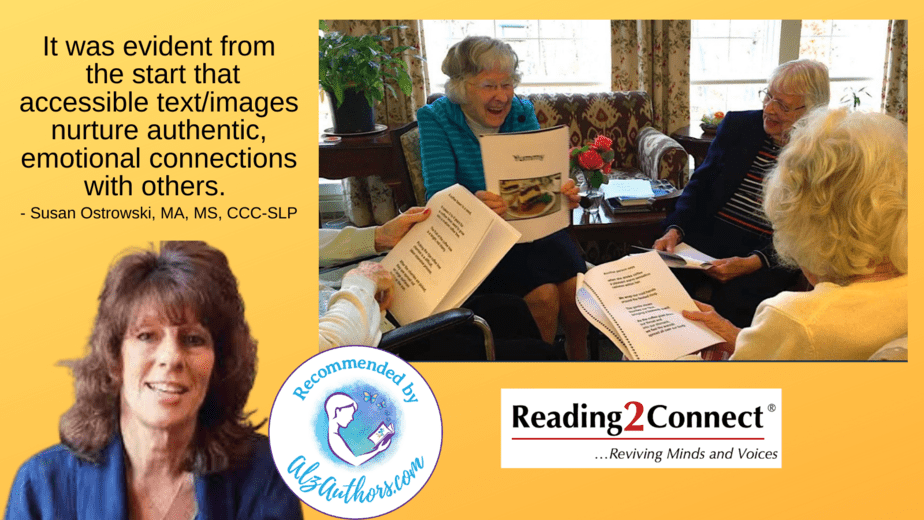By Susan Ostrowski
If you search online, “Why do people read?” you’ll find answers like:
“I read to know I’m not alone.”
“Books unfold new worlds, worlds that can sing to me, comfort me, quiet me.”
“Books help me understand who I am.”
Such gifts are especially precious during the aging process.
As a Speech Pathologist, I entered senior care in my late 40s, having no personal or professional experience in the field. The first time I walked into a skilled nursing setting I almost lost my composure. The residents appeared half asleep, detached, silent. They were being simultaneously over-stimulated and under-stimulated. The excessive noise and movement around them was often meaningless and of no value to them.
At that moment, I pledged: Before I leave this earth, I will contribute something to help change the culture of aging. I didn’t know what I could offer, but I kept my mind and heart open for a spark of an idea.
How the books were conceived
That spark came one day while I was administering a cognitive evaluation with Mr. S, a resident, who despondently failed the reading subtest. This was nothing unusual. I saw nursing home residents fail standardized reading tests all the time. But for some reason, this time struck me. I thought, “Well, why can’t he read? He has functional use of spoken language, why not written language?”
Mr. S shared that reading was one of the things he missed most. And so we began, with Mr. S in the lead, to find his barriers to reading and to identify ways to get around those barriers. Through trial and error, we experimented with modifications to an article, making sure to retain the article’s integrity and intelligence. Eventually, it worked! With our applied text adaptations, Mr. S. was able to read the article comfortably, and to talk enthusiastically about what he read.
I asked him if he would like me to share this with his family so that they could produce more accessible articles for him. He said, “Yes…I feel saved.”
Over time, an interdisciplinary team of professionals, residents, and families worked to adapt text for more individuals living with dementia. We explored modifications to text elements, such as typeface, graphic layout, lineation, and syntax.
The responses from the community were overwhelmingly positive. Meaningful, adapted reading gives this readership agency, expands their minds, and provides a scaffolding for personal expression. It was evident from the start that accessible text/images nurture authentic, emotional connections with others.
How the books were created
To build our collection of age/dementia friendly books, I often sat with residents, with my laptop, showing them images related to a given topic. Their responses kindled our writing. Once a draft of a book was put together, we field-tested it and modified it according to residents’ feedback. This stage of production was critical. We learned quickly that this population has no tolerance for bad writing, boring writing, or patronizing writing. Like anyone, they will put such content right down. They require, and of course deserve, ability-appropriate and age-appropriate books.
Reading2Connect has created over 50 age/dementia friendly books. Our books cover an array of topics, from high interest (e.g., pets, sports, travel) to culturally specific topics (e.g., Jewish reflections, the Korean war, Rosa Parks). Our books are printed on washable, tear-resistant paper for infection control and durability.
How to obtain these books for your loved one
Our books are not available commercially, but are sold as a complete program for either senior care settings (eg, skilled nursing, assisted living, day centers), or libraries. Each program provides a collection of books and staff/partner training. You can introduce our program to either of these settings for the benefit of your loved one, and, if they acquire the program you’ll have access to the books. We also offer a program for individuals (eg, family members, volunteers, companions) called “The Conversational Support Program.” LIke the other Reading2Connect programs, this support partner program provides books and training. In this program, we look at ways to use our books to maximize independence and nurture authentic emotional connections during one-to-one social interactions. I’m happy to provide flyers with more information about all of our programs.
Let’s not accept our assumptions about reading and dementia. Let’s expand our notions of what adult reading material should look like. Lifelong readers should not have to enter into a literary abyss when typical published material becomes inaccessible.
About the Author
 With an MA in remedial reading and an MS in speech pathology from Columbia University, Susan Ostrowski has experience in a variety of senior care settings, from skilled nursing to traditional homes. Susan has contributed to multiple publications, including the American Speech and Hearing Association Perspectives Journal and the Thieme Medical Publishers Communication Sciences Case Study Textbook. Susan is a recipient of the 2021 Mather Institute Promising Practices Award, the 2021 Dementia Society of America Dementia SMART Award, a 2021 Beryl Institute Research Grant, and the 2020 American Speech and Hearing Association Clinical Recent Achievement Award recognizing her work at Reading2Connect®.
With an MA in remedial reading and an MS in speech pathology from Columbia University, Susan Ostrowski has experience in a variety of senior care settings, from skilled nursing to traditional homes. Susan has contributed to multiple publications, including the American Speech and Hearing Association Perspectives Journal and the Thieme Medical Publishers Communication Sciences Case Study Textbook. Susan is a recipient of the 2021 Mather Institute Promising Practices Award, the 2021 Dementia Society of America Dementia SMART Award, a 2021 Beryl Institute Research Grant, and the 2020 American Speech and Hearing Association Clinical Recent Achievement Award recognizing her work at Reading2Connect®.
Connect with Susan Ostrowski



4 Responses
Wow, Susan, your success in reading impresses based on my experience. My daughter is in her latter stages, and I wish I’d known your program sooner. I’m going to promote it at the assisted living facility where my daughter resides.
Thank you, James, for your comment. Your daughter and other residents are fortunate to have you thinking creatively on their behalf. Please feel free to reach out to me directly if you would like more information about how to bring age/dementia friendly reading to residents, or if you would like to chat more about the preserved, latent reading capacities of those living with dementia.
Thank you again for your feedback.
Susan
Susan@Reading2Connect.com
Hi Susan
I have been reading everyday to my 85 year old mother , her favourite authors , stories , poems . She used to love reading books of all kinds . Lately she has been complaining of poor eyesight and so I thought it will be nice for both of us if I read her chosen books or write ups
But recently I find that she is unable to follow , comprehend as easily as she could few months back .
I would like to know how I can help her , help her so that she can have that connection again with stories poems etc .
Looking forward to hearing from you
Hello, Nandini,
Good for you to use books to connect in a such a substantial and personal way with your mother!
Probably her comprehension difficulties have to do with sentences that are too long and a story with too many details to keep at the forefront of her mind. You can compensate for some of these difficulties by reading more slowly, perhaps pausing after each sentence or two, and perhaps discussing the content as you read. You can also write down for her (in big print) the main characters, places, context, and even a brief story line that you and she can refer to often during the reading.
Also, many family members find library materials (with the help of the librarian) that are shorter pieces of work and include images, but of course are for adults, not for children. This kind of material is out there; you just have to search. You can also find on Amazon books for people living with dementia to enjoy with family members. You’ll know if they are books your mother will appreciate.
Last tip, make sure when you are reading together that the environment is quiet and well-lit, and that she is seated so she can see your face/mouth as you read. This will help her with initial comprehension and retention.
Wishing you and your mother joy, peace, and happy reading!